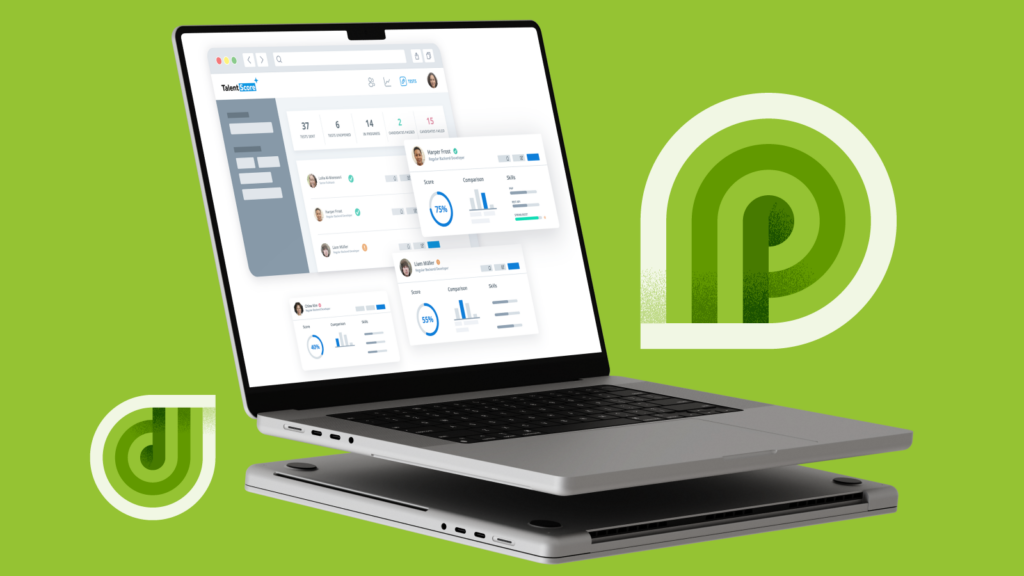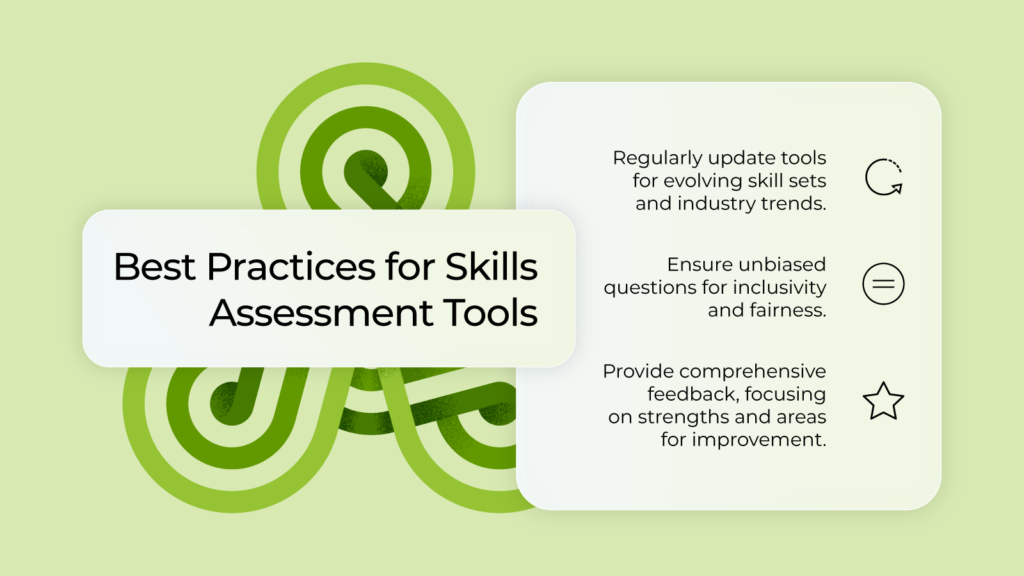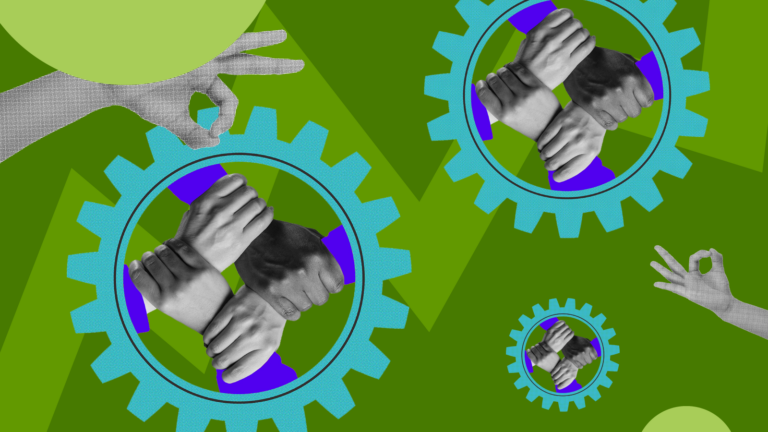
La clave para liberar el potencial de las herramientas de evaluación de competencias

Skills assessment tools offer a systematic approach to evaluating those skills, both for individuals and organizations. By providing a framework for measuring abilities, these tools serve as a compass, guiding individuals toward professional growth and organizations toward strategic workforce planning.
This misalignment not only diminishes the potential of individuals but also hinders the overall productivity of an organization. So, the question that arises is, how do you accurately determine which employee is best suited for a particular role or project? Enter: skills assessment software.
These advanced skills assessment tools are designed to precisely evaluate and match the capabilities of employees to the requirements of specific roles. By leveraging the insights gained from such software, companies can maximize the efficiency, job performance, and potential of their teams. Let’s dive deeper into understanding how they work and the benefits they bring!
Comprehensive guide to top skills assessment tools
Navigating the modern business landscape requires a keen understanding and effective implementation of talent acquisition strategies. More importantly, it demands accurate and efficient skills assessment tools. These tools are paramount in identifying the best candidates whose skill sets align with the specific requirements of a role. Let’s delve into some compelling advantages of incorporating these tools into your hiring process.
Specific assessments for streamlined hiring
Skills assessment tools empower organizations to move beyond the limitations of traditional resumes and subjective interviews. Instead of relying solely on self-reported experience, these tools offer standardized evaluations that allow for objective comparisons between candidates. This is particularly valuable in technical fields where practical skills are paramount. For instance, a company like DevSkiller, a leading name in the TalentTech domain, provides a platform called TalentScore. This platform stands out by employing real-world programming assignments, encompassing areas such as Cloud, Cybersecurity, and Data Science, to assess candidates effectively.
Focused evaluations with global standards
By setting a standardized benchmark, skills assessment tools streamline the hiring process, enabling recruiters and hiring managers to focus their efforts on the most promising candidates. This targeted approach saves time and resources by reducing the likelihood of unsuitable candidates progressing through multiple interview rounds. Moreover, this method allows for a more efficient evaluation of candidates from diverse backgrounds and experiences.
Based assessments for dynamic interaction
Moving beyond static assessments, many modern tools, such as DevSkiller’s TalentScore, offer dynamic features. These features may include cutting-edge analytics, real-world testing environments, and custom task builders, all contributing to a more comprehensive and insightful evaluation of a candidate’s abilities. These dynamic assessments accurately represent a candidate’s problem-solving skills and adaptability in real-world scenarios. Additionally, they can help identify individuals with high learning potential, a valuable trait in today’s rapidly evolving job market.

Evaluating skills: Bridging the gap between talent and requirements
Effectively evaluating skills is paramount to bridging the gap between talent and requirements. As businesses seek individuals with specific expertise, relying solely on traditional resumes and interviews often falls short in providing a comprehensive understanding of a candidate’s true capabilities. This is where innovative skills assessment tools, such as those offered by DevSkiller, come into play.
DevSkiller is a leading TalentTech company that provides cutting-edge solutions for talent acquisition, gestión de competencias, and employee development. Their platform offers a range of products designed to help organizations make informed decisions about their workforce. One such product is DevSkiller TalentScore, which empowers organizations to conduct real-world technical assessments. By presenting candidates with actual programming assignments, TalentScore accurately measures their ability to apply their knowledge in practical scenarios.
But it doesn’t stop at technical skills. DevSkiller TalentBoost takes a broader approach by leveraging advanced skills ontologies to map and assess over 3,000 digital and IT skills. This comprehensive approach provides organizations with deep insights into their employees’ capabilities, allowing them to identify skill gaps and tailor development plans accordingly.
Why skills assessment tools are essential for businesses today
In today’s competitive business landscape, making informed decisions is more crucial than ever. Did you know that 50-90% of the purchase decision is complete before a buyer interacts with a sales rep? This highlights the shift in power dynamics within the sales process. With potential customers conducting extensive research beforehand, businesses need to equip their sales teams with the tools they need to showcase their expertise and value proposition from the very first interaction. This is where skills assessment tools come into play. I use the term “tools” because this encompasses a variety of methods and resources that go beyond traditional testing.
Think about it: instead of relying on subjective opinions during interviews, these tools provide objective data about a candidate’s abilities. This data-driven approach empowers businesses to make informed decisions, ensuring they attract and retain top talent.
Types of skill assessment tools
There’s no one-size-fits-all here. Different tools cater to various needs.
Evaluaciones técnicas
Just as a budding musician meticulously practices scales to hone their craft, a programmer delves deep into the intricacies of coding languages to perfect their skills. For the musician, knowing the scales is foundational; it’s the basis upon which melodies, harmonies, and entire compositions are built.
Similarly, for a programmer, mastery over code isn’t just about writing lines on a screen, but about crafting digital symphonies that power applications, websites, and systems. It’s this expertise that separates novices from maestros in both fields.
That’s where technical assessments come into the picture. They serve as a measure of an individual’s proficiency, much like a musical audition might gauge a performer’s aptitude.
Evaluaciones técnicas scrutinize an individual’s ability to handle specific job-related tasks, ensuring that the person possesses the requisite knowledge and skill set.
Through these online assessments, employers can confidently identify top talent, ensuring that the individuals they bring on board are not only familiar with the basics but are truly adept at their craft.

Soft skills evaluation
Have you ever encountered someone who’s undeniably brilliant in their field, yet their interactions leave much to be desired? Perhaps they’re a touch abrasive, overly direct, or simply don’t gel well with the team. In the professional world, technical expertise is undoubtedly vital, but the importance of soft skills cannot be overstated.
These encompass qualities like effective communication, empathy, teamwork, and adaptability. While hard skills might get tasks done, it’s the soft skills that ensure tasks are accomplished harmoniously and collaboratively.
Aquí es donde soft skills evaluations come into play. By measuring interpersonal skills, communication abilities, emotional intelligence, and other crucial traits, these assessments offer insights beyond mere technical prowess. They shed light on how an individual might fit within a team, manage conflicts, or lead projects.
By prioritizing soft skills evaluations, businesses can cultivate a harmonious workplace where individuals not only excel in their roles but also contribute positively to the overall work environment and culture.
Cognitive abilities testing
Remember those mind-bending logic puzzles that would have you scratching your head for hours? Those puzzles, as tricky and fun as they were, do more than just entertain.
They engage our cognitive faculties, challenging us to think critically, draw conclusions, and employ logical reasoning. Similarly, in the professional realm, cognitive tests serve a pivotal role.
These aren’t mere puzzles designed for amusement; they’re tools carefully constructed to evaluate an individual’s problem-solving abilities, logical reasoning, analytical skills, and more.
Just as a logic puzzle might reveal how one approaches a complex problem, cognitive tests offer insights into how a potential employee might tackle real-world challenges, come up with innovative solutions, and make decisions under pressure.
By implementing these assessments, employers can gain a deeper understanding of a candidate’s cognitive strengths and weaknesses, ensuring they select individuals equipped not only with the right knowledge but also with the mental agility and acuity to thrive in their roles.
Best practices for using assessment tools
Think about the frustration and inefficiency of using a hammer when what you really need is a screwdriver.
You might get the job done, but it would be far from optimal and might even cause damage.
In a similar vein, simply having skills assessment tools in an organization’s arsenal isn’t enough; understanding how to utilize them effectively is paramount. Just as every tool in a toolbox has its specific use, skills assessment tools should be employed with precision and purpose.

Best practices include regularly updating the tool to keep abreast with evolving skill sets and industry trends, ensuring questions remain unbiased to foster inclusivity and fairness, and providing detailed feedback to candidates.
This feedback isn’t merely about indicating right or wrong answers, but about giving comprehensive insights into areas of strength and those requiring improvement.
By adhering to these best practices, organizations can harness the full potential of skills assessment tools, ensuring they accurately identify, nurture, and place talent in roles where they can truly shine.
The future of skill assessment
Picture this: a world where cutting-edge AI-driven tools don’t just assess your current abilities but also extrapolate and forecast the skills you might develop in the future.
It might sound like a page out of a science fiction novel, but with the rapid advancements in technology, it’s a reality that’s edging closer every day. Instead of merely evaluating where you stand now, these tools could provide insights into your potential growth trajectory, identifying paths and opportunities that align with your latent talents and future capabilities.
This futuristic vision signifies the convergence of technology and evaluación de competencias, a blend of artificial intelligence’s predictive prowess with the nuanced understanding of human potential. As we stand on the cusp of this exciting frontier, one can only wonder at the vast possibilities it holds.
Will it redefine talent management? Could it revolutionize personal growth and career development? While the specifics remain to be seen, one thing is certain: the fusion of technology and skill assessment software promises a horizon brimming with potential and innovation.
Benefits of using skills assessment tools
In the intricate dance of recruitment and talent management, precision is paramount. Enter the skills assessment tool, an invaluable asset in the hiring process.
At its core, this tool doesn’t just streamline the recruitment procedure; it revolutionizes it. One of its most immediate advantages is cost-efficiency. By accurately gauging the abilities of candidates, businesses can drastically reduce the costs associated with bad hires, prolonged training periods, and high turnover rates.
But the benefits don’t stop there. The skills assessment tool ensures that the right candidate—someone whose skills align perfectly with the job’s requirements—gets the position. This not only optimizes team productivity but also fosters job satisfaction among employees, as they find themselves in roles that resonate with their expertise and passion.
In a competitive marketplace where every hire can significantly impact an organization’s trajectory, the numerous benefits offered by a skills assessment tool make it an indispensable instrument in the toolkit of modern businesses.
Elegir la herramienta adecuada a sus necesidades
Consider the decision of selecting a vehicle. If you’re a thrill-seeker looking for speed and performance, a sleek sports car might be your pick. However, if you have a large family and need space for soccer practices and grocery runs, a minivan would be the obvious choice.
It’s not about which vehicle is better universally, but rather which one suits your unique needs and lifestyle. The same logic applies when choosing tools and resources for an organization. It’s not just about grabbing the most popular or technologically advanced tool on the market; it’s about understanding what your organization specifically requires.

Before making a selection, it’s imperative to clearly define your company’s goals, challenges, and long-term vision. Do you need a tool that scales quickly for rapid growth, or is stability and long-term reliability more crucial?
By having a clear understanding of where your organization stands and where it aims to go, you can ensure that every tool and resource you invest in is perfectly aligned with your mission, propelling you towards success with precision and purpose.
Limitations and challenges
Every tool, no matter how advanced or well-regarded, comes with its set of limitations. This universal truth holds in the realm of technology, academia, industry, and beyond.
For instance, even the most sophisticated systems might inadvertently harbor biases, whether due to the data they were trained on or the inherent inclinations of their designers. Such biases, if unchecked, can skew results and lead to less than optimal decisions.
Furthermore, the dynamic landscape of skills and competencies presents another challenge. As industries evolve and technologies advance, the skills deemed essential today might become obsolete tomorrow.
Relying too heavily on a static tool without adapting to these changes can leave organizations trailing behind in the competitive race. It’s for these reasons that a conscious awareness of a tool’s limitations is crucial.
By understanding and acknowledging these constraints, users can employ tools more judiciously, complementing them with human judgment and continuous updates. This balanced approach ensures that while tools provide valuable insights and efficiency, their potential pitfalls are kept in check, leading to more informed and robust outcomes.
Real-life examples of skill assessment implementation
Remember that breakout company that seemingly came out of nowhere and skyrocketed to success last year? Behind the scenes, it’s likely they had more than just a unique product or service driving their ascent.
A critical aspect of any successful venture is the team powering it. To build such a formidable team, companies are increasingly recognizing the importance of both technical skill and holistic skill assessment.
While having the technical expertise is undeniably essential, understanding how to evaluate those skills effectively is equally crucial.
By employing comprehensive skill assessment methods, companies can identify not just technical prowess but also other vital attributes, like problem-solving abilities, adaptability, and teamwork. It’s this holistic approach to hiring and team-building that separates industry leaders from the rest.
So, when you see companies making waves in their respective sectors, it’s a good bet they’ve mastered the art and science of using skill assessment tests, ensuring every team member is not only technically adept but also a perfect fit for the company’s culture and vision.
How skills assessment affects employee engagement and career development
Skills assessment tools are instrumental in boosting employee engagement and fostering career development. By identifying strengths and areas for improvement, these assessments provide employees with a clear understanding of their current capabilities.
Assessment features
Employees can leverage this understanding to pursue personalized learning and development opportunities aligned with their career aspirations and their roles. Such alignment not only enhances their skills and job satisfaction but also increases their engagement and productivity.
Friendliness
Moreover, the use of these tools demonstrates that the company is invested in its employees’ growth. This commitment fosters a culture of learning and development, making employees feel valued and appreciated, which further contributes to their engagement and loyalty to the company.
Benefit analysis of popular tools
When choosing among the many skills assessment tools available, companies should conduct a thorough benefit analysis. This analysis should consider factors such as cost, ease of use, and relevance to the company’s specific needs and industry. By selecting the right tools and strategies, companies can leverage skills assessments to drive employee engagement, optimize talent management strategies, and create a more productive and fulfilling work environment.
Conclusión
So, ready to find the perfect fit for your company? Skill assessment tool, when used correctly, can be the compass guiding you to success. Remember, it’s not about just having the pieces, but making sure they fit perfectly.
Discover how DevSkiller’s skill assessment tool can help you.




